


Christmas Store
The holidays are just around the corner so now is the time to fetch the finest gifts for the Labrador Lover on your Christmas list. We have over 100 gifts $50.00 and under. Visit our Christmas Store.
For the Lab
Bedding
Coats
Collars and Leads
Dog Bowls
Feeding Stations
Spa and Grooming
Toys and Treats
Travel and Accessories
For the Lab Lover
Apparel
Cards and Giftwrap
Fine Accessories
Gifts and All Occasions
Jewelry
Kids Only
For the Lab Home
Artwork
Books
Garden and Outdoor
Home Furnishings
Kitchen Accessories
Pillows, Throws, and Rugs
Gift ServicesGift Boxes
Gift Certificates
Choosing a Veterinarian
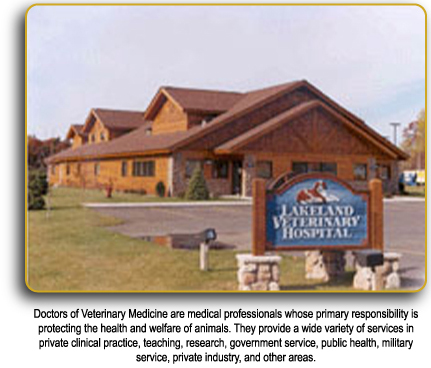
Recently I received a phone call from a breeder friend of mine, looking for referrals on veterinarians. After many years at a certain veterinary practice, she had decided to find a new vet because her senior Lab was going to need surgery and she had become dissatisfied with her current veterinarian’s practice. The two of us went down the list of probably a dozen veterinary practices, as far as one hour from her home. We also solicited the assistance of our All Labs Vet to give us her insight on the various clinics. Even with our combined experience in breeding Labs, this was a daunting task. Choosing a veterinarian for your Lab is an important personal choice, much like choosing a pediatrician or dentist for your family. Veterinary practices are businesses and come in many shapes and sizes, offering varying ranges of services and facilities depending on their location, practice size, facilities and staff. Next to you and your family, a veterinarian is the most important person involved in your Lab’s well-being.
The definition of a good vet varies from person to person, just like with doctors. Some people like a straight forward, down to earth, no fuss doctor while others like a doctor who shows a lot of compassion and has good “bedside manners.” In selecting a veterinary practice, your aim should be to find the veterinarian who best meets your needs and to establish a long-term relationship.
Understandably you want someone with good credentials, (a degree of Veterinary Medicine and a state license), but you also want someone you and your Lab can feel comfortable with, someone who will answer all your questions no matter how insignificant. Nobody wants to feel belittled by a vet over the use of medical jargon, nor do they want to leave the vet’s office without the faintest idea of what the vet just told them. A vet that understands an owner’s fears and apprehensions is one that can be trusted to deal with your concerns during more harrowing situations such as a severe illness or surgery.
When choosing a vet, be sure to explore all the possible avenues and do not take for granted that your local vet offers the best service. It is a good idea to investigate as many vets in your proximity as possible in order to gauge the general standard of practitioners in the area. This should afford you the opportunity to make a more informed decision about who gets to take care of your beloved Lab.

When to Begin the Process
It is important to start looking for your veterinarian before you bring home your new family member. Many breeders require that you have an initial vet check-up with the new puppy within the first week to ten days. Having a veterinarian chosen before you actually need him or her in an emergency situation is critical. If you’ve moved to a new location, start looking for a new vet as soon as the boxes are unpacked.
Where to Start-Ask for Recommendations
The hardest part of finding a new vet seems to be-just getting started. Sure, you can go through the yellow pages and look at the fancy phone book ads, search the web or drive around your area looking for vet clinics, but that does not insure a positive working relationship. The best place to begin your search for the right vet is by “word of mouth”.
Ask people that you trust to recommend a good vet and to tell you why they chose him or her. Some sources for recommendations might include dog breeders, friends, neighbors, coworkers who own pets, breed clubs or local training clubs (obedience, agility, herding, etc.). If the same veterinarian’s name comes up repeatedly, that’s a good sign. Remember though, that their choice might not be yours. Some vets are better with one type of pet over another or some breeds over others. Another option is to contact your state’s veterinary association. Many of them have a “Find a Vet” or “Locate a Doctor” option on their website.
Make Some Calls
Once you have compiled a list of possible candidates, call their offices to ask for basic information regarding:
-
Number of Vets and Technicians on Staff
-
Degrees and Affiliations of the Vets
-
Services Offered:
On site lab testing?
X-ray facilities?
Do they have specialties?
Do they provide other services such as boarding or grooming?
If these are services that you require, they may be important factors in your decision.
-
Office Hours
-
Emergency Procedures
-
Fees: There are usually set fees for routine services like check-ups or vaccinations and higher fees for special exams. Note that prices are set by each individual veterinary practice and each one has different expenses that are covered by fees charged (i.e., state and local taxes, salaries, rent, utilities, equipment overhead, continuing education, etc.) Often, the different prices do not reflect the same set of services, even though there may be certain basic procedures in common. The choice of potentially better but more costly drugs, the availability and use of newer surgical and medical products, and the choice of an individualized, safer anesthetic protocol for your pet represent some of the many reasons for "cost for service" variations.
-
Payment: Do they accept major credit cards? Will they allow you to make payments if your dog requires an expensive surgery or treatmen.

While you investigated the points above, how were you treated on the phone? Was the receptionist helpful and patient with you? Was the office attentive to your questions and concerns? Were you comfortable with the answers given? How you were treated on the phone might be a good indication of how you and your Lab will be treated in person.
Narrowing Down the List
Narrowing down the choice to one or two can be more difficult. One must weigh many factors when choosing the right vet. Some obvious aspects to consider are location and office hours. Finding a vet close to you can be critical in case of an emergency and if you have to take time out of work to get to an appointment. However, if you have specific needs such as reproduction, alternative or holistic therapies, or a veterinary clinic experienced with epileptic seizures which might require 24 hour on-staff observation, you may be forced to use a clinic further down the road.
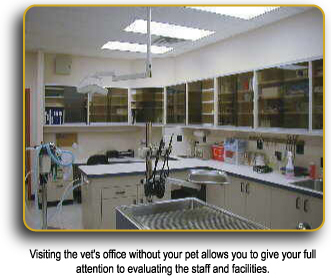
Pay a Visit without Your Lab
Once you have narrowed your choice to one or two, schedule an appointment with your top picks. This visit is essential as it will probably be the deciding factor. You can tell a lot about a veterinarian by visiting the clinic. When you arrive, take note of the condition of the office. It should look tidy and smell reasonably clean. Do not even consider a poorly maintained or dirty clinic as it could be a great way of spreading disease. The size of the waiting room might be a consideration as well. Are you and your Lab comfortable waiting in a tight spot? Look at the notice boards-are there any “Thank you” letters displayed or any pictures of client’s pets? How does the staff interact with the other owners and their pets? See if there are any brochures or leaflets about the practice available.
n|Look for an AAHA (American Animal Hospital Association) affiliation-it’s always a good sign, but it is not essential. The AAHA guidelines ensure good veterinary practice but many times hospitals will follow the guidelines without going through the added expense of getting certified.
Ask for a tour of the facilities. This will help you to better examine the area where your Lab will be treated. The staff’s willingness to accommodate your request says a lot about the clinic. It is understandable if they cannot immediately grant you a tour if they are very busy or perhaps have an emergency patient, but they should be willing to give you a tour at another time. Ask to see where overnight patients are housed and how they are supervised “after hours.” The examination rooms should be clean and orderly. Has the table been wiped after the last patient left? Does the staff seem knowledgeable and helpful? Does talking with them produce a level of comfort that insures the opportunity to work with them for the lifetime of your companion?
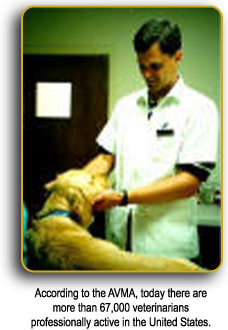
Schedule a Routine Visit for Your Lab
The vet’s first exam of your Lab should include taking the dog’s temperature and weight, feeling the dog over for suspicious lumps or bumps, looking in the eyes and ears, listening to the heart, and checking the teeth. The vet should ask you questions and make notes about the dog’s general health and medical history. Does the vet rush the general check up or not do it at all? Does he or she seem to have a good rapport with your dog? Does your dog seem to like the vet or at least seem comfortable? Of course some dogs are difficult at every vet visit and if your dog is one of these, is the vet able to handle him? An experienced vet can handle the most difficult dog with a minimum of stress for the dog. It’s a good opportunity to trade views and see if their philosophies regarding pets and pet care mirror your own.
If you are addressing specific symptoms of concern, the vet should present his diagnosis and any necessary treatment options in a clear and open way that is easy to understand. If they bombard you with technical language, you won't have a clue what they’re talking about or what you should do next. And don’t be reluctant to take notes-in fact it’s very useful to have a notebook just for vet visits. While a vet will keep detailed records themselves, he or she should be willing to assist you in recording the name of a condition or disease, the medication required and any new symptoms to look for. It’s easy to forget these things when you’re stressed about your Lab’s medical condition and a vet shouldn’t discourage you from keeping your own records.
Does the veterinarian seem open and interested in you and your pet’s needs? This will come from the vet’s genuine love of animals, not just the love of the job. It is fairly obvious to see whether or not a vet is devoted to his or her cause through the love of animals, in the same way you can tell if a dog breeder loves dogs. Your vet should not only be sensitive to the feelings and fears of your pet, but also to those of you, the owner. You may even prefer a vet who has dogs of their own and this is the time to ask about their pets. Remember, if you don’t feel comfortable with the vet, you should find someone else!
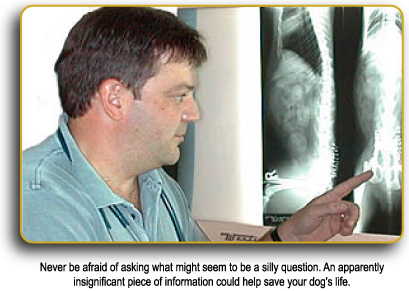
What to Ask
One of the first questions you should ask is whether this vet is available in emergencies, and if so, how can you contact them. If they are not available, what 24-hour emergency care plan are they associated with? It is important to have this information on hand in an emergency when minutes count. Is there more than one vet working in the office and do they make house calls? Can you request a specific veterinarian?
What kind of blood work/testing are they able to do on-site? One of the main complaints pet owners have is delayed test results. Nobody wants to be left waiting on important results for any length of time. Obviously there is no way for you to tell beforehand whether your vet is dedicated to informing customers quickly of test results as they are received, but you should try to find out their procedures when you are making your general inquiries about the clinic.
Ask the vet how he or she would treat a specific condition that may affect Labradors (i.e. hip dysplasia, PRA or epilepsy, for examples.) It is important to find a vet who keeps current with the latest advances in veterinary medicine and who can communicate with you in a helpful, clear manner. Do they offer OFA, PennHip, CERF and other genetic testing? For Labs that you intend to breed, the screening of their eyes, hips, elbows and heart for genetic defects is critical. While many genetic tests have to be sent off for final evaluation and determination, you want a vet who understands the importance of such testing.
Do the veterinarian and staff attend seminars, workshops and other professional functions? The world of veterinary medicine is ever changing and you want a vet who is proactive professionally and open-minded enough to update their education and abilities. The last thing you want is a vet with an "I know it all, seen it all and done it all" attitude. You want a vet that is open and comfortable requesting second opinions when necessary.
Today, there are specialties in orthopedics, anesthesia, behavior, cardiology, dentistry, dermatology, emergency and critical care, internal medicine, neurology, oncology, ophthalmology, radiology and surgery. These, as in human medicine, require additional training above and beyond the regular DVM.
Do they offer special testing for geriatric diseases? What are their policies and procedures for euthanasia? It’s certainly not pleasant to think of your Lab’s final years, but when the time comes, you’ll want a vet who will work with you to provide the optimum care and treatments to help your dog live a long, healthy life. And when the time comes to make a decision on putting your dog to sleep, you’ll want a vet that is willing to discuss all the options with you and make the process as comforting as possible for both you and your family as well for your loved companion.
In Conclusion
At this stage, you should have enough information about the practice to make a decision as to whether it will be right for you and your pet. Once you’ve selected a vet, you’ll want to stick with them. Keep your vet informed of any changes in your dog that concern you. Your vet will maintain a history of your Lab, including health records that detail immunizations, reactions to medications, growth or weight loss, and a history of any surgeries or complications. It is now up to you and your vet to work as a team to provide the best possible care for your Lab.
There are many criteria for choosing a vet and the criteria often vary depending on the needs of the dog and owner. But one thing that always seems to make a vet stand out from the rest is the vet that is prepared to “go the extra mile”. This is when a vet goes above and beyond the call of duty to ensure the health and safety of his patients and their owners. Pet owners often say that this makes all the difference between a good vet and an exceptional one.
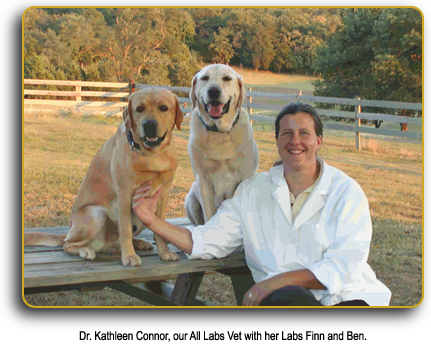
VETERINARIAN’S OATH
(Adopted by the AVMA 1999)
Being admitted to the profession of veterinary medicine, I solemnly swear to use my scientific knowledge and skills for the benefit of society through the protection of animal health, the relief of animal suffering, the conservation of animal resources, the promotion of public health, and the advancement of medical knowledge. I will practice my profession conscientiously, with dignity, and in keeping with the principles of veterinary medical ethics. I accept as a lifelong obligation the continual improvement of my professional knowledge and competence.
For help in finding a vet in your area, we invite you to visit these links:
 Can You Spot The Holiday Hazards?
Can You Spot The Holiday Hazards?It’s easy for pets, especially Labradors, to get into trouble during the holidays. You may get so busy that you lose track of what is going on with your dog.
Click here to learn more about: "Can You Spot The Holiday Hazards?"

Would you like to see your Lab pictured here? Send us images of your Lab and we may include them on our Home Page!
Labrador Links
The Verstaile Lab
History of the Lab
Advice
Travel
Featured Labs
Featured Artists
.jpg)

